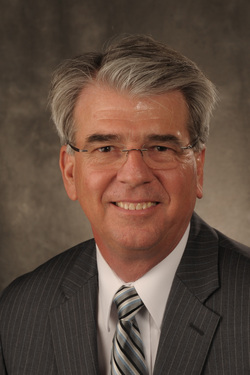 Professor of forestry and 2011-2012 Regents Professor Dr. Jimmie Yeiser
Professor of forestry and 2011-2012 Regents Professor Dr. Jimmie YeiserNACOGDOCHES, Texas - The upcoming Stephen F. Austin State University Regents Lecture by Dr. Jimmie Yeiser, director of the Forest Resources Institute and holder of the T.L.L. Temple Chair in the Arthur Temple College of Forestry and Agriculture, will focus on Texas' invasive plant and animal species and their impact on ecosystems.
Yeiser, who earned the Regents Professor designation from SFA in 2011-12, will deliver this year's address at 5:30 p.m. Monday, April 30, in Regents Suites A and B of the Baker Pattillo Student Center on the SFA campus. Refreshments will be served, and there is no admission charge.
He defines an invasive species as any species that is non-native or alien to the ecosystem under consideration and whose introduction causes or is likely to cause economic or environmental harm or harm to human health. The lecture will focus on identifying the invasive species of Texas, how these species spread, why we should care about invasive species and what invasive species activity is occurring in our region.
"An invasive species reproduces, grows and spreads rapidly, establishing and persisting over large areas," Yeiser said. "Species that become invasive succeed due to favorable environmental conditions and lack of natural predators, competitors and diseases that normally regulate their populations. "
He explained that invasive species negatively impact ecosystems and are expensive to manage.
"In fact, invasive species are a significant threat to almost half of the native U.S. species currently listed as federally endangered," he said. "It is very expensive to prevent, monitor and control the spread of invasives, not to mention the damage to crops, fisheries, forests and other resources. Invasives cost the U.S. $137 billion annually. Some of the most harmful individual species cost in excess of $100 million annually."
Yeiser is recognized regionally, nationally and internationally as a leader in product development for woody and herbaceous plant control in southern forests.
He currently teaches intensive silviculture and chemical management of pasture, fence row and forest pests, both at the senior and graduate levels. His research emphasis is herbicidal management of forest vegetation.
Yeiser, a professor of forestry, joined the SFA faculty in 1999, having worked previously at the University of Arkansas at Monticello and the Arkansas Agricultural Experiment Station. He has held the T.L.L. Temple Chair for 13 years and is director of the university's Forest Resources Institute.
He received the 2006 Faculty Excellence and Achievement in Research award from the SFASU Foundation. In 2007, he was named a fellow of the Society of American Foresters, and in 2008, he was honored with the Research, Development and Innovation Award from the Texas Forestry Association. He currently serves as chairman of the Texas Society of American Foresters and is on the Board of Directors for the Texas Forestry Association.
He helped develop all the major products produced by BASF, Dow AgroSciences, DuPont and Monsanto used today in southern pine management: Roundup, Roundup Pro, Accord SP, Accord Concentrate, Accord XRT, Accord XRT II, Garlon 4E, Garlon 3A, Garlon 4 Ultra, Garlon XRT, Milestone VM, Milestone VM Plus, Tordon 101, Pathway, Pathfinder II, Velpar L, Velpar DF, Oust, Oust XP, Oustar, Escort, Escort XP, Oust Extra, Arsenal AC, Chopper, Chopper GEN2, Pendulum, Fusilade, Poast, Vantage and Vanquish.
He earned a Bachelor of Science in forestry and a Master of Science in agriculture, both from the University of Kentucky, and a Ph.D. in tree improvement from Texas A&M University. During his time at SFA, Yeiser has published 178 articles, given 186 presentations and acquired more than $4 million in grants.
This is the seventh in a series of lectures delivered by SFA Regents Professors. The series is sponsored by the SFA Office of the Provost and the University Lecture Series Committee.
For more information, call (936) 468-2605.
 Axe ’Em, Jacks!
Axe ’Em, Jacks!